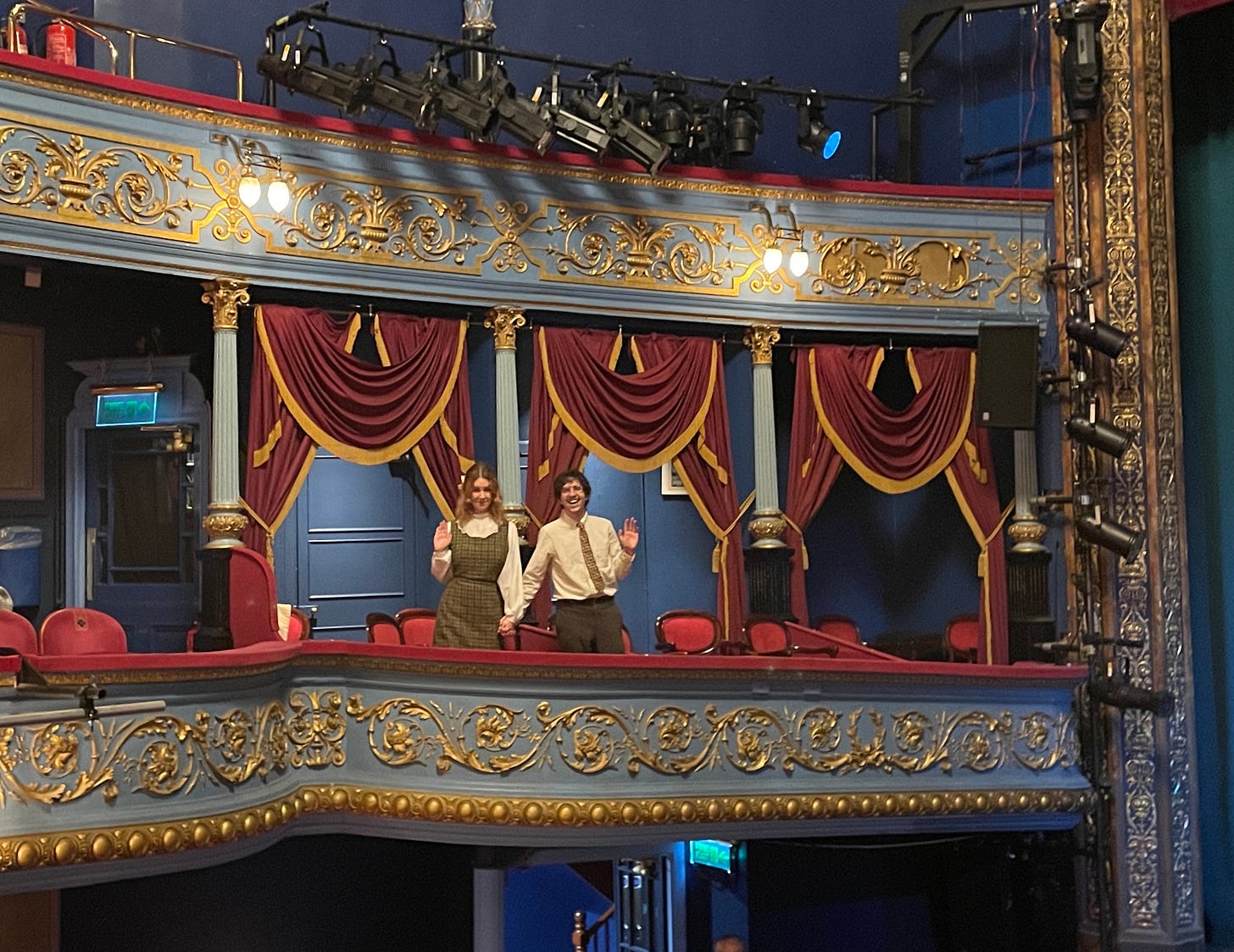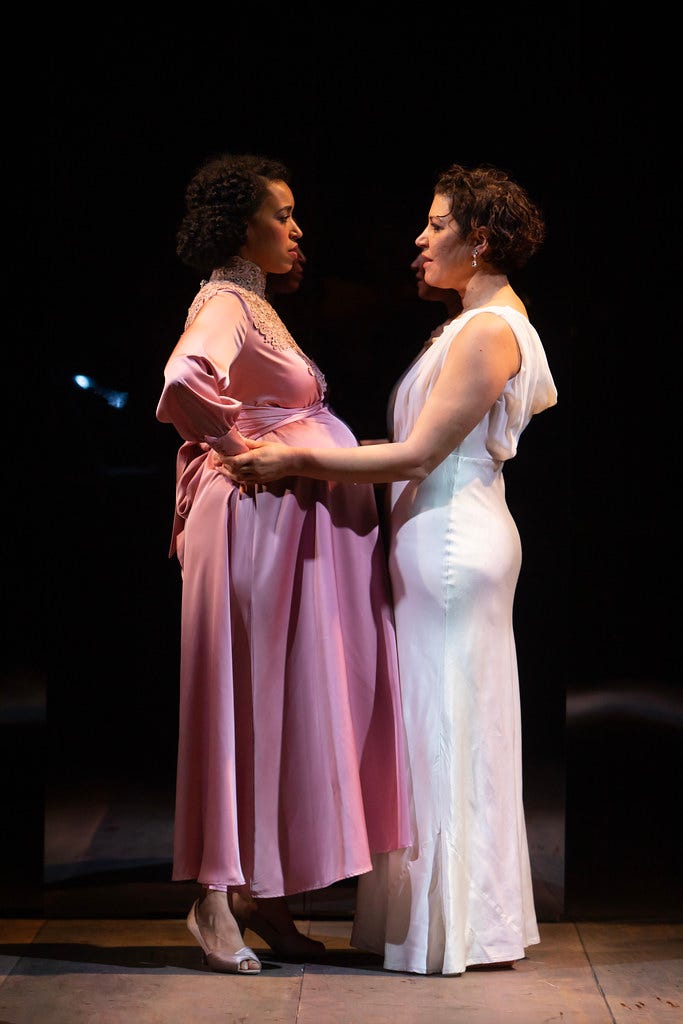The Tragedy of Woke Shakespeare
A consideration of literary modernisation and a review of the worst play I've ever seen
The mountains in Maine are the same as the mountains in Scotland. The earth feels familiar underfoot, it looks familiar, low tide smells the same. This is not metaphor, but geology: both places have a bedrock of greywacke and once formed the Central Pangean Mountains hundreds of millions of years ago. The people, too, seem similar, though I don’t think any academic study has been conducted investigating the link between a rocky, grey coastline and rosy cheeks and hearty breakfasts.
We went to Scotland for Charlie’s birthday; a long weekend trip, a two-hour flight from Berlin, and my present to him. I figured if we were going to go to Scotland we might as well really have a Scotland Trip, so I made the arrangements for us to see the highland cows, visit an old castle in the highlands, and attend a production of Macbeth at the Royal Lyceum Theatre in Edinburgh. We sat in the box seats, Charlie and Charlie, a zillenial Statler and Waldorf. Before I continue, I must make two contradictory admissions: I am a major Shakespeare nut, and I have never seen nor read Macbeth. Here is a list of things I knew about the play before attending this production:
-This play takes place in Scotland. It’s an old theatre curse never to say the name out loud in a theatre and instead refer to it only as “the Scottish play.”
-There are three witches, who say the words “bubble, bubble, toil and trouble” and “something wicked this way comes” at some point in the play. These may be the opening lines, but I am not sure.
-There is a character named Lord Macbeth who would like to become King of Scotland. At some point there is some sort of murder, and he goes a bit mad and becomes obsessed with washing the imagined blood off his hands. He has a speech at the end where he goes “tomorrow and tomorrow and tomorrow” and talks about the world being a stage and the men and women merely players. I’ve read it before. It’s enjoyable.
-There are characters named Malcom, Duncan and Macduff.
-There is a character named Lady Macbeth, who is conniving and political and wants her husband to be king, a goal she reaches through manipulation. She laments that she was not born a man since her gender distances her from power. In one of the Pretty Little Liars books, Spencer is cast as Lady Macbeth which is fitting for her because she is also a type-A control freak. I imagine her as somewhere between Hillary Clinton and Rachel Berry and Anna Delvey. I know more about Lady Macbeth than her husband because I’ve only ever heard her discussed as the real focal point of the play; she seems to be a character that people find very compelling and from what I know is very gaslight, gatekeep, girlboss.
Zinnie Harris’s Macbeth (an undoing) is a semi-retelling of Macbeth which centers Lady Macbeth instead of her husband. It uses both the original text of the play and new dialogue written by Harris. Harris has a BA in zoology from Oxford and has adapted several pieces of classic theatre, including the Oresteia, A Doll’s House, and Rhinoceros. Her retelling of Macbeth was, in two words, comically bad.
Macbeth (an undoing) is a play that focuses on Lady Macbeth. Macbeth is also a play that focuses on Lady Macbeth. Harris’s retelling begins with the premise that Lady Macbeth is a misunderstood character, one who is relegated to the side lines and not granted the depth and complexity she possesses. Throughout the play, it is unclear of Harris is critiquing Shakespeare’s writing or centuries of audience interpretation of her character. Both of these positions seem illogical: Shakespeare has written a fictional character who manipulates the people around her, has a socially unacceptable desire for power, and understands that her gender limits her ability to act while also granting her an unassumingness she can use to her advantage. Lady Macbeth herself says “Come, you spirits, that tend on mortal thoughts. Unsex me here, and fill me from the crown to the toe top-full of direst cruelty! […] Come to my woman's breasts, and take my milk for gall, you murdering ministers, wherever in your sightless substances, you wait on nature's mischief!” I don’t know what audiences were saying about Lady Macbeth in Shakespearean England, but I do know how to use JSTOR to find countless articles over fifty and even one hundred years old theorizing that Lady Macbeth is the real star of the play, a compelling and complex woman deserving of intense academic study.
At its inception, before its first page was even penned, Macbeth (an undoing) was a cursed production because it was simply the wrong play. Not only was it the wrong play, it was the wrong Shakespeare play; if Harris wanted to breathe new light into a female character whose suffering seemed to exist for the complexity of a man, why not give this treatment to Ophelia? Better yet, why not to Desdemona from Othello, a far more underexamined character whose narrative sits at the intersection of discourses about power, sexuality, race, and sexual violence? If the play must be Macbeth, why not Lady Macduff, whose brief appearance but plot centrality make her a much better subject for a re-interpretation? It is this purposelessness and tepid liberal feminism that colour the entire two-and-a-half hour runtime of the production.
At the end of the first act, we arrive at a dinner party hosted by Lord and Lady Macbeth. As jazz poured out of the theatre speakers (nothing says ancient and royal decadence like a canned MP3), after the table was set and the revelry had begun, I realized we were witnessing not only a re-written but modernized version of Macbeth. We were still in Scotland, still in a castle somewhere up in the highlands, Lord Macbeth was still Thane of Cawdor, but now it was also the 1920s. Lord and Lady Macbeth were, apparently, familiar with the cultural output of the Harlem renaissance and unquestioningly embraced the aesthetics of a youth movement localized in New York and London. At first I thought this was just a costuming decision, but later in the play Lady Macbeth pulls out a gun and a character is referred to as having “bullets in his head”, so it is an in-universe truth that these characters are living just years after the Great War decimates Europe, something never discussed by the King of Scotland or anyone else in the play, for that matter. (A small and petty critique from the box seats: outside of a gorgeous pink silk dress worn by Lady Macduff, almost every costume in this play, particularly those worn by Lady Macbeth, looked incredibly cheap and hastily made. In what world would a woman obsessed with power and control be wearing rayon? Even in press photos, you can see puckering in the seams of her dress!)
The decision to set Macbeth (an undoing) in the jazz age comes to stand in for the largest problem of this play: a lack of commitment and any concrete perspective in favour of vaguely political but wholly non-offensive ambiguity. I can understand why Harris chose the 1920s as a setting: women’s fashion became more androgynous, wealth inequality skyrocketed, a general air of rebellion intersected with high-level corruption, at least in the United States. But Macbeth (an undoing) has about the same level of understanding and analysis of the 1920s as any teenager who has just watched the Baz Luhrmann adaptation of The Great Gatsby for freshman-year English class; it is simulacra, a vague allusion to what we think of when we think of the 1920s, meant to evoke an idea of perspective without ever directly commenting on the material realities of the era.
The choice of time period serves as a prime example of Macbeth (an undoing)’s failings, an evocation of politics gestured at but ultimately meaningless. Throughout the play, Harris waffles between statements. We are stuck in political purgatory as Harris attempts to explicitly assert two contradictory ideas: Lady Macbeth is a powerful, shrewd woman who embraces her ambition, to see her as caring is to paint a misogynistic maternalism on a woman who actively rejects it. At the same time, she is also sensitive, empathetic, and passionate, to see her as conniving is to demonize women in power. Any way we see Lady Macbeth is evidence of our own prejudices against powerful women and Harris alone has the capacity to liberate us from them. It is a politic I can only describe as Clintonesque, something that feels so unimaginably boring and overdone almost a decade after Hamilton exploded onto the masochistic liberal guilt market.






